Business News
IMF sees India growing 6.6% despite US tariffs, but lists 2 big risks ahead
.png)
2 min read | Updated on November 27, 2025, 09:42 IST
SUMMARY
India’s economy is projected to grow 6.6% in FY2025-26 even under the baseline assumption of prolonged 50% US tariffs, the IMF said in its annual assessment.

The IMF called for targeted, time-bound tariff relief, careful tracking of the fiscal impact of tax cuts, and flexible exchange rate management.
India’s economy is expected to grow 6.6% in FY2025-26 under the baseline assumption of prolonged 50% US tariffs, the International Monetary Fund said.
The growth, however, is projected to moderate to 6.2% in FY2026-27.
“India’s economy has continued to perform well. Following the economic growth of 6.5 per cent in fiscal year 2024/25, real GDP expanded by 7.8 per cent in the first quarter of fiscal year 2025/26," the IMF said in a statement after its Executive Board completed an annual assessment for India.
Headline inflation has eased sharply, helped by subdued food prices, and is expected to remain contained.
Resilient services exports have helped keep the current account deficit in check, while fiscal consolidation has advanced, the Fund noted.
It also said India’s financial and corporate sectors remain strong, supported by healthy capital buffers and multi-year low non-performing assets.
What are the risks ahead?
The IMF warned that near-term risks persist.
Further deepening of geoeconomic fragmentation could tighten financial conditions, raise input costs, weaken trade and foreign investment flows, and weigh on growth.
Unpredictable weather shocks could affect crop yields, adversely impact rural consumption and reignite inflationary pressures, it added.
IMF Executive Directors commended India’s economic resilience and policy discipline but said achieving fiscal deficit targets will require strong spending control.
While welcoming the recent simplification of the GST, they called for careful monitoring of the fiscal impact of the reduction in GST and personal income tax rates.
The Directors also recommended that tariff relief measures should be targeted, transparent, and time-bound, and that the pace of fiscal consolidation in FY2026/27 should be conditional on the impact of tariffs on the output gap.
The Directors felt that, if tariffs persist at current levels, there would likely be scope for further monetary easing amid benign inflation dynamics. They recommended continued efforts to enhance monetary transmission, as well as greater exchange rate flexibility to help the Indian economy absorb external shocks.
The IMF underscored that comprehensive structural reforms are critical to support India’s economic development.
Directors welcomed the recent labour market reforms and encouraged the authorities to enhance human capital and female labour force participation, continue with the public investment push, and strengthen the business environment.
The Indian authorities have consented to the publication of the IMF staff report prepared for the consultation, the Fund said.
By signing up you agree to Upstox’s Terms & Conditions
About The Author
Next Story

